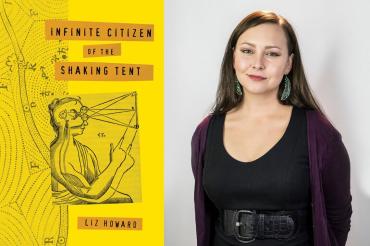U of T's Liz Howard, winner of the 2016 Griffin Poetry Prize

Published: June 21, 2016
The University of Toronto's Liz Howard is back in the lab but still getting used to the fact that she is this year's winner of the Griffin Poetry Prize – the youngest poet to receive the prestigious award.
“When Tracy K Smith said my name I reflexively doubled over and buried my face in both palms,” the U of T alumna and staff member told U of T News.
“I suppose I had to shut out some of the enormity that was flooding my senses. What I felt and still feel is shock and profound gratitude.”
Howard won Canada's top prize for poetry with her debut book, Infinite Citizen of the Shaking Tent.
The $65,000 award is believed to be the world’s largest prize awarded for poetry.
Listen to a Radio Canada International interview
Read a Globe and Mail interview with Howard
Howard was drawn to biological science beginning in high school and it became the focus of her undergrad studies at U of T.
“I never thought of myself as science-oriented but that is what I excelled at. I loved, and still do, neuroanatomy, especially. The Latinate words used to name parts of the brain were simply gorgeous to me. What is more beautiful sounding than the ‘bed nucleus of the stria terminalis?’ I was hooked.”
As the research officer of Professor Lynn Hasher’s Aging and Cognition Laboratory, in the department of psychology, Howard manages a staff of research assistants, coordinates experiments, recruits participants, creates ethics applications and reports, and oversees all aspects of the day-to-day operations of the lab.
“I’ve been in this position for nine years, beginning just after undergrad graduation, and have been working part-time since enrolling in an MFA program in Creative Writing via the University of Guelph, now completed,” Howard said. “I also recently started working part-time in Professor Cheryl Grady’s Neurocognitive Aging Lab at UofT affiliated Baycrest Centre for Geriatric Care.”
Howard signed up for a poetry class with U of T’s School of Continuing Studies after graduation. In an interview with jacket2.org, Howard said:
"I had just completed a degree in science and I saw this as an opportunity to take a poetry course. I have written poetry since I was very young but I did not pursue it in my undergraduate studies for a complicated set of reasons. Even so, I continued to write and even gave a few quivering open mic readings. This free course presented me with an opportunity to learn more about the craft and receive feedback on my writing.”
She continued with the School of Continuing Studies at U of T, signing up for the Poetry II course with instructor Margaret Christakos, who became her mentor and the supervisor of her master’s thesis at Guelph.
By coincidence, U of T president Meric Gertler has just written a column for U of T Magazine, focusing on the School and the opportunities it provides to our alumni and to the wider community.
“I was absolutely thrilled to hear about Liz Howard winning the Griffin Poetry Prize,” he said. “Literature, the arts and culture will always be crucial to our society, and Liz Howard provides a brilliant example of what an educated, creative mind can achieve when we decide to keep learning after graduation.”
Howard describes literature and science as “twin rigours that have occupied me and continue to grow.
“It is my experience that both are a way to know, know about oneself and the world,” Howard said. “They are in no way mutually exclusive. Synthesis, in everything.
“I pull from the language and theoretical underpinnings of cognitive psychology and neuroscience directly in my work. Poets who have a background in English or critical theory might pull from/be inspired by Beowulf, the works of Homer, or Derrida. I had Kandel et al.’s Principles of Neuroscience. The idea of memory as a reconstructive and plastic process-as in a recollected memory trace is always re-inscribed with the subsequent context of the recollection – I think is a critical concern in my work, if not an ongoing armchair philosophical obsession in my own mind!”
Howard’s work at U of T continues to sustain her work as a poet. “The lab job has enabled me to live in this expensive city. It has also given me unfettered access to U of T’s physical and digital library holdings, very important as research is key in my ‘process’.
But the job is more than a way of making a living or gaining access to one of the top three library systems in North America.
“It has been an inspiration to see graduate students come into the lab and then ultimately defend their dissertations,” Howard said. “To know that I have in some way assisted in that process is very rewarding.
“I remember attending a lab meeting in the recent past at which both Professors Hasher and Grady were in attendance and the research of the young women students in the lab was being discussed. It was a moment of beauty and pride for me. To present in this room of intelligent, ground-breaking women was incredible. Incredible especially to think on how impossible it would have been not too long ago.”


